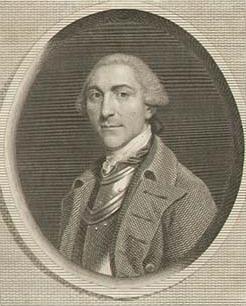Washington’s Whisper
Anecdote of [George] Washington.—In debate, in the house of delegates of Virginia, 1817, on the bill relative to a map of the state, in which something was said of military roads, Mr. Mercer, (L) related and applied an anecdote of general Washington, which he had received from a member of the convention that formed the constitution of the United States.This story struck me as odd for Washington. If we’d heard about that quip without knowing who said it, we’d ascribe it to Benjamin Franklin or Gouverneur Morris or someone else known for sarcastic wit. Washington was indeed a stickler for protocol as chairman—so much so that I was surprised that he might violate neutrality even in this whispered way. So I got curious about whether I could tease out any more information about this story’s provenance.
The subject of power to be given the new congress, relative to a standing army, was on the tapis. A member made a motion that congress should be restricted to a standing army not exceeding five thousand, at any one time. General Washington, who, being chairman, could not offer a motion, whispered to a member from Maryland, to amend the motion, by providing that no foreign enemy should invade the United States, at any one time, with more than three thousand troops.
During the 1816-17 legislative session, the Virginia House of Delegates did indeed debate a bill about “a map of the state.” Formally it was “An act ‘to repeal in part an act entitled “an act to provide an accurate chart of each county, and a general map of the territory of this Commonwealth,”[’”] but some earlier law needed amending in order to get the work done.
The reference to “Mr. Mercer, (L)” confused me until I figured out there were two men named Mercer in the Virginia House of Delegates that term. John Mercer represented Spottsylvania County, and Charles Fenton Mercer represented Loudoun County. The “(L)” stood for Loudoun and was a way to designate the right man.
Charles Fenton Mercer was a nephew of John Francis Mercer (1759-1821), who spent a couple of weeks at the Constitutional Convention in August 1787 representing Maryland—and thus fits the description of the source for this story.
Washington was well acquainted with John F. Mercer, having employed his older half-brother George as an aide de camp during the Seven Years’ War. (George Mercer’s career in Virginia ended after he accepted the job of stamp master in 1765.) John F. Mercer himself served in the Revolutionary War as an officer under the general’s second cousin William Washington, as an aide to Gen. Charles Lee in 1778-79, and finally as a cavalry officer at Yorktown.
The Mercers owed Washington money, resulting in a long correspondence from 1783 on. In 1786, for instance, Washington wrote a letter to John F. Mercer with a notable remark on slave-trading. They also discussed the debt in Philadelphia during the summer of 1787.
TOMORROW: When could this exchange about a standing army have happened?

